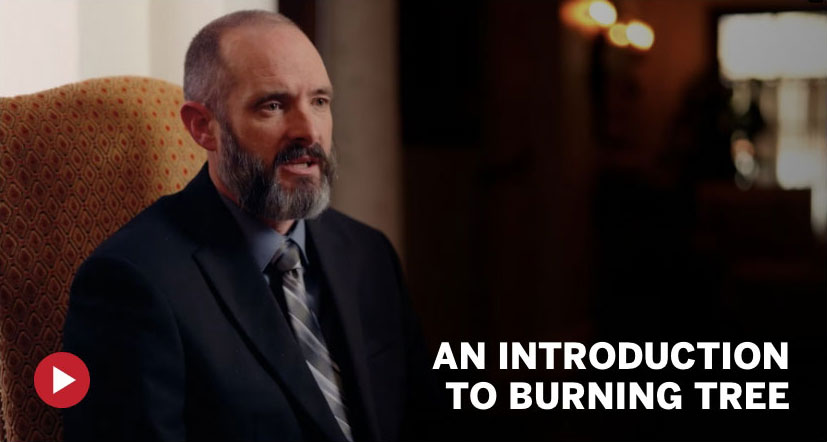Dual Diagnosis for Mental Health & Chronic Relapse
Dual Diagnosis Treatment At Burning Tree Ranch
Dual diagnosis generally refers to the existence of multiple mental health conditions in an individual. Such a diagnosis may also include substance use disorder or a related chemical dependency.
For families witnessing a loved one grapple with both psychological affliction and addiction simultaneously, the situation can reasonably provoke immense distress. It’s hard to watch someone you care about live through a downward spiral, and it’s emotionally taxing to be close to the vortex created by an individual trapped in a cycle of relapse.
Properly treating dual diagnosis – mainly when substance use is involved – necessitates an integrative approach that comprehensively addresses the intricate interplay between mental illness and the substance abuse issue.
Mental Health Disorders Common in Dual Diagnosis
- Personality Disorders Learn more about personality disorders & the relationship with substance abuse.
- Anxiety Disorders Generalized anxiety disorder & phobias are highly prevalent in dual diagnosis.
- Feeding & Eating Disorders Eating disorders like binge eating bulimia may coincide with substance abuse issues.
- Sleep-Wake Disorders Sleep disorders like insomnia may contribute to self-medicating with substances.
- Trauma & Stressor-Related Disorders PTSD & acute stress disorders frequently co-occur with addiction.
- Obsessive-Compulsive & Related Disorders Learn more about OCD & related disorders co-occuring with substance use.
- Neurodevelopmental Disorders Learn about how ADHD & similar disorders can increase the risk for substance abuse.
- Bipolar & Related Disorders Bipolar disorders include manic episodes where substance abuse is more common.
- Depressive Disorders Alcohol & substances are commonly used to self-medicate for depressive symptoms.
How We Manage Dual Diagnosis at Burning Tree Ranch
Burning Tree is the Nation’s only authentic long-term treatment provider specializing in the treatment of chronic relapse. We address life and death matters as they relate to chronic addiction and mental health.
- Long-Term Progress-Based Mental Health And Chronic Relapse Treatment
- 8-14 Months Of Residential Inpatient Care
- One-Year Specialized Aftercare Programming And Supportive Living
- Emphasis On Identifying Misdiagnosed And Undiagnosed Co-Occurring Disorders
- Exclusive Focus On Treating Chronic Relapse Clients
- Specialized Programming To Address Personality And Mood Disorders
- Trauma-Informed Care Featuring Equine And EMDR Therapy
- Neurofeedback Sessions Facilitated For The Duration Of Inpatient Treatment
The Burning Tree Client
- Continues substance use despite increasingly grave consequences
- Struggles with undiagnosed, misdiagnosed, or untreated co-occurring disorders
- Fails to maintain therapeutic, medication, and self-care routines
- Faces difficulties in managing anxiety, depression, and stress
- Delays seeking help, minimizing the gravity of their addiction
The Chronic Relapser
- Resists accepting full responsibility for recovery
- Blames setbacks and shortcomings on external influences
- Exhibits compelling arguments when motivated.
- Possesses a high capacity for persuasion
- Provides limited details when pressed for clarity
- Acts without considering the long-term consequences
- Accepts help conditionally, if at all
Burning Tree Families often describe these behaviors as perplexing and, at times, deeply frustrating. Yet, the overriding sentiment revolves around the pain they cause.
Who Refers to Burning Tree?
Since 1999, we have supported countless referring professionals in delivering ethical, high-quality solutions to the clients and families they represent.
Healthcare Providers
Identifying & Understanding Dual Diagnosis
Receiving a dual diagnosis is fairly common, affecting an estimated 9.2 million adults in the United States each year. Also known as co-occurring disorders, dual diagnosis can involve any combination of mental health conditions like depression, anxiety, bipolar disorder, PTSD, personality disorders, etc. along with alcohol, prescription drug, or illegal substance abuse and addiction.

Why Understanding Dual Diagnosis Matters in the Context of Chronic Relapse
For families, it’s crucial to recognize and understand how mental health disorders and substance abuse issues exist simultaneously. The existence of one condition tends to exacerbate another, creating a cyclical pattern that is incredibly difficult to break. Understanding this dynamic helps guide an integrative treatment approach targeting both issues in a coordinated effort rather than leaving one or the other unaddressed which impedes progress.
Discovery & Diagnosis Before Treatment
The initial discovery of a dual diagnosis is often challenging, as the combination of symptoms can be difficult to untangle. Mental health screening tools and comprehensive personal and family histories help identify co-occurring issues. Diagnosis also depends on ruling out any underlying medical conditions or separating independent mental health symptoms from substance-induced ones. A proper evaluation by qualified mental health and addiction professionals is essential for an accurate dual diagnosis assessment.
Our Integrative Approach to Treating Dual Diagnosis at Burning Tree Ranch
We believe it is critical to address addiction and co-occurring disorders concurrently during the same treatment episode. Our Texas-based chronic relapse facility includes a team of licensed professionals who specialize in recognizing and treating underlying mental health conditions for individuals struggling with chronic relapse. We address every diagnostic variable that may have prevented an earlier recovery opportunity.
Often, we discover a simple truth: previous treatment episodes lacked the necessary time, expertise, and ability to address the relationship between addiction and mental health meaningfully. As a result, relapse occurs.

We treat co-occuring disorders that have historically prevented our clients from maintaining permanent recovery in the past.

Interactions Between Mental Illness and Substance Abuse
The cyclical nature of relapse with a dual diagnosis means the mental health issues and substance abuse reinforce each other through processes like self-medication and increased brain disruptions. This makes integrated treatment focusing on both components simultaneously crucial for recovery.
Commonly Abused Substances
In dual-diagnosis cases, some of the most frequently abused substances include alcohol, prescription medications, opioid painkillers, benzodiazepines, stimulants like cocaine and methamphetamine, and marijuana. Different mental health issues may be susceptible to the abuse of other substances based on their effects.
Self-Medication Hypothesis
The self-medication hypothesis suggests that individuals with mental illness may abuse substances as a way to cope with uncomfortable psychological symptoms. For example, depressants like alcohol to dull emotional pain or stimulants to overcome low motivation from depression.
Mental Illness Increasing Addiction Vulnerability
Specific mental health issues increase the biological and psychological vulnerability to developing substance use disorders. Conditions like schizophrenia, bipolar disorder, ADHD, and conduct disorders are risk factors for addiction. Poor impulse control, emotion dysregulation, and maladaptive coping mechanisms play a role.
Substances Worsening Mental Health Symptoms
While substances may temporarily mask or numb symptoms, they ultimately end up worsening the underlying mental illness. Substance-induced psychosis, increased anxiety/depression, cognitive impairments, and disruption of adequate mental health treatments are everyday negative interactions.
Challenges for Families in Treating Dual Diagnosis
Receiving an Accurate Diagnosis
Obtaining an accurate dual diagnosis assessment can be difficult. The complex interplay between mental health symptoms and substance abuse effects often creates a confounding picture. Mental health professionals must work to distinguish substance-induced issues from those stemming from an underlying psychiatric condition. Comprehensive medical, psychological, and substance use histories are essential for an appropriate diagnosis. Even then, dual diagnosis may go undetected or be misdiagnosed. Any dual diagnosis related to substance use must be given or confirmed by a licensed mental health professional.
Finding a Reliable Facility for Integrated Treatment
Historically, mental health and addiction treatment services have operated in siloed settings with limited communication. This dated model poorly serves those with co-occurring disorders who require a unified treatment approach addressing both issues in a coordinated, multidisciplinary fashion. Truly integrated dual diagnosis programs providing combined psychological and medical management are still lacking in many regions.
Many programs and facilities that tout dual diagnosis treatment are unequipped, understaffed, or simply not designed to address the relationship between addiction and mental health in any meaningful, lasting way. Short-term solutions offer only reprieve for individuals where there is a sustained pattern of crisis and relapse.
The challenges lie in getting an accurate evaluation from professionals adept at untangling the complexities and locating and utilizing programs fully equipped to provide integrated, tailored dual diagnosis treatment matching the individual’s needs.
Overall, the nature of dual diagnosis prevents a “one-size-fits-all” solution. That’s why Burning Tree emphasizes an authentic long-term treatment approach that considers each individual’s unique circumstance and that of the entire family.
Recovery Outlook & Aftercare for Successful Treatment
Managing Dual Conditions Long-Term through Personal Accountability
Successful long-term management of co-occurring disorders hinges on individuals embracing personal responsibility for their recovery journey. While professional treatment provides foundational skills and support, sustainable progress is driven by the client’s daily commitment to wellness.
This involves owning one’s thoughts, feelings, and behaviors – achievements and setbacks. Cultivating self-awareness to recognize stressors, monitor symptoms, and proactively employ coping strategies is crucial. When challenges arise, it’s essential to self-advocate and independently pursue solutions, whether that’s adjusting medications with a psychiatrist, processing emotions with a therapist, or utilizing relapse prevention techniques. Recovery is an ongoing, active process requiring personal accountability.
Relapse Prevention
Maintaining hard-won progress means immersing oneself in the daily disciplines of recovery. Regularly attending 12-step support groups like Alcoholics Anonymous provides peer encouragement and structure to stay on track.
Engaging with sponsors, peers, and fellow AA members who emphasize personal accountability helps prevent complacency and regression. Working in a recovery program, including the 12 steps, reinforces vital spiritual principles like honesty, open-mindedness, and willingness. Practicing holistic self-care, managing stress, and avoiding high-risk situations are essential preventative strategies. Vigilance and a daily re-commitment to recovery are imperative.
Improved Quality of Life
The ultimate goal of dual diagnosis treatment is not just the absence of substances and psychiatric symptoms but the presence of a fulfilling life.
Individuals in recovery can achieve financial independence through stable employment and money management skills. Emotional freedom comes from healing relationships, setting healthy boundaries, and practicing self-acceptance.
Making amends to loved ones, offering forgiveness, and rebuilding trust fosters meaningful connections. Finding purpose through service work, mentoring others, and contributing to society enhances self-esteem. Living with integrity, aligning one’s actions with their values, and being a positive role model are the hallmarks of long-term recovery. While setbacks may occur, each challenge is an opportunity for growth and resilience. With commitment and support, a rich, rewarding life in recovery is within reach.
How Do I Know If My Loved One is a Fit for Burning Tree Ranch?
Featured In Top Publications









